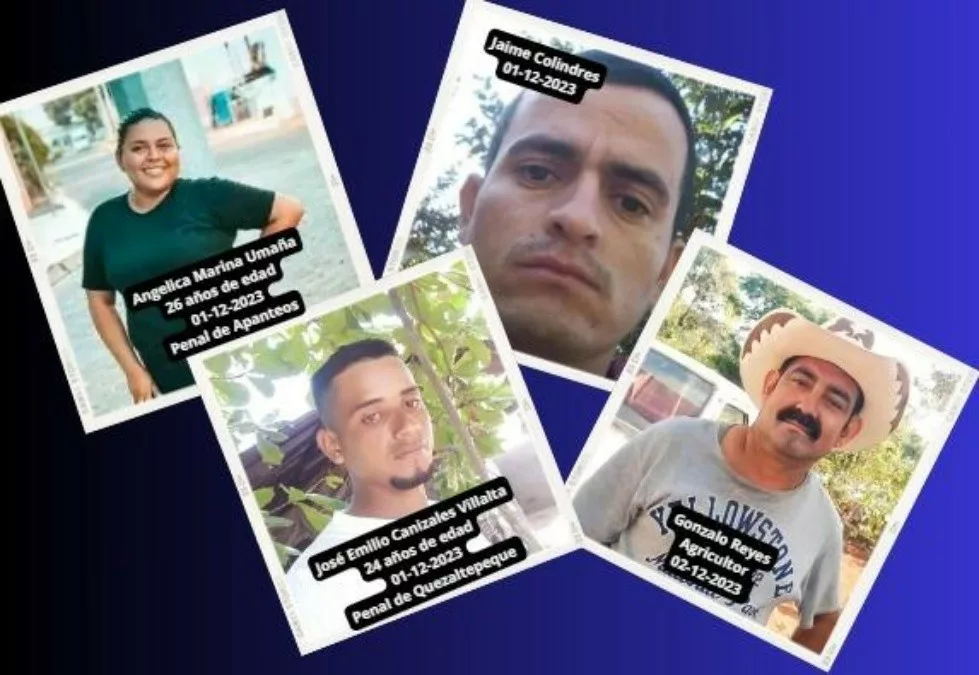Human rights organizations such as the Victims of the Regime Movement (MOVIR) and the Legal Humanitarian Aid have spoken out on social media about the deaths of four incarcerated individuals, all of whom were captured during the state of exception and had not been tried.
The Legal Humanitarian Aid reported that within a span of two days, four inmates died in different correctional facilities. None of them were identified as gang members, nor had they been convicted.
Furthermore, it stated that none of them had the right to defense, a hearing, or a fair trial, and emphasized that they were presumed guilty from the start, with the state being responsible for their deaths.
On the other hand, the Victims of the Regime Movement in El Salvador (MOVIR) shared details about some of the deceased individuals.
More victims of the regime
Angélica Marina Umaña, 26 years old, died on November 30th in the Apanteos Prison, Santa Ana. According to official information, she died by “hanging in a cell.”
Another case occurred on December 1st, where Jaime Colindres, a resident of San Benito, Cinquera, Cabañas, had recently been released in a delicate state of health.
Samuel Ramírez, a member of MOVIR, mentioned that farmer Gonzalo Reyes, arrested in August and originally from Sensuntepeque, Cabañas, died on December 1st. Reyes suffered from a chronic illness, and his death is attributed to the lack of adequate medical attention for chronically ill patients in the penitentiary system.
Reyes’ arrest was questioned by family and friends, who considered him an honest and hardworking person.
“Many of these cases involve bodies being delivered with signs of violence, while others die due to lack of healthcare. They are arrested while sick and only end up dying in prisons, so we regret that this situation is happening and we stand in solidarity with the victims’ families,” added Ramírez.
These organizations provide assistance to the relatives of individuals detained during the state of exception in El Salvador, and also report on various cases they have documented.
This information is important to shed light on the human rights violations that have occurred during this period of exception and to pressure the government to take measures to ensure justice and reparations for the victims.
Contabilizan cuatro muertes de privados de libertad en últimos dos días, en el marco del régimen de excepción
Organizaciones defensoras de derechos humanos como el Movimiento de Víctimas del Régimen (MOVIR) y el Socorro Jurídico Humanitario se pronunciaron en redes sociales por la muerte de cuatro personas privadas de libertad, todas ellas capturadas durante el régimen de excepción y que no habían sido juzgadas.
El Socorro Jurídico informó que en un lapso de dos días cuatro reclusos murieron en diferentes centros penales. Ninguno de ellos estaba perfilado como pandillero, ni tampoco había sido condenado.
Además, afirmó que ninguno tuvo derecho a defensa, audiencia o un juicio justo y señaló que se les presumió culpables desde el inicio, siendo el Estado el responsable de sus muertes.
Por otra parte, el Movimiento de Víctimas del Régimen en El Salvador (MOVIR) compartió detalles sobre algunas de las personas fallecidas.
Más víctimas del régimen
Angélica Marina Umaña, de 26 años, murió el 30 de noviembre en el Penal de Apanteos, Santa Ana. Según información oficial, falleció “ahorcada en una celda”.
Otro caso ocurrió el 1 de diciembre, donde Jaime Colindres, residente en San Benito, Cinquera, Cabañas, había sido liberado recientemente en un estado de salud delicado.
Samuel Ramírez, miembro de MOVIR, mencionó que el agricultor Gonzalo Reyes, capturado en agosto y originario de Sensuntepeque, Cabañas, murió el 1 de diciembre. Reyes padecía de una enfermedad crónica, y su fallecimiento se atribuye a la falta de atención médica adecuada para los enfermos crónicos en el sistema penitenciario.
La captura de Reyes fue cuestionada por familiares y amigos, quienes lo consideraban una persona honrada y trabajadora.
“Muchos de estos casos, los cuerpos son entregados con golpes, otros mueren por falta de atención en materia de salud. Son capturados enfermos y sólo llegan a morirse a los penales, por lo que lamentamos que esta situación esté pasando y nos solidarizamos con los familiares de las víctimas”, agregó Ramírez.
Estás organizaciones brindan ayuda a los familiares de las personas detenidas durante el régimen de excepción en El Salvador, también informan de diferentes casos que tienen registrados.
Esta información es importante para visibilizar las violaciones a los derechos humanos que se han cometido durante este período de excepción y para presionar al gobierno para que tome medidas para garantizar la justicia y la reparación a las víctimas.

